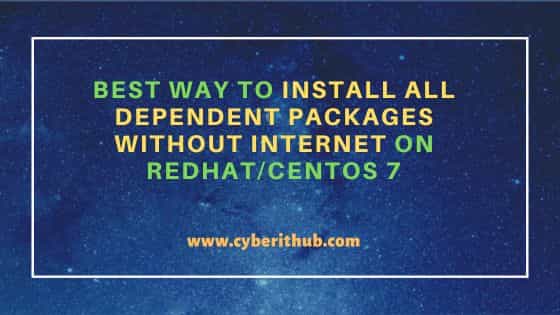Table of Contents
In this article, I will take you through the steps to install all dependent packages without internet on RedHat/CentOS 7 with the help of an example. Sometimes your server resides in private network with no connection to outside world. For installing packages you probably won't be able to use yum package manager to download and install all dependent packages from the repository.
So in those scenarios, you can either do two things - either you setup one local repo and install from there or you can download all the dependent packages required for the installation of an application and install them by using rpm utility. Here we will see how to download all the dependent packages and install them using rpm utility.
What are Dependent Packages
Dependent packages are the libraries, modules and other pre required packages which are needed for an application or software to install and work on a Linux based systems. Without it, application won't be able to install and run properly. If you forcefully install an application without installing its dependencies, it will probably keep on crashing and fail to work.

Best way to Install all dependent packages without Internet on RedHat/CentOS 7
Also Read: How to Install or Enable ssh on Ubuntu
Step 1: Prerequisites
Here we will take an example of SNMP Package where we needed to install net-snmp package along with its dependent packages. Before we go through the steps to install all dependent packages, you need to have all packages downloaded and kept in one directory. Here i have compressed the packages in packages.tar.gz format to reduce the size which will help in quickly uploading the packages to the Server.
NOTE:
yum install net-snmp. It will give you all the dependent package names with correct version required. You can further search and download those packages from https://rpmfind.net on some other system which has internet connection.
Step 2: Untar all the files
Since we have kept packages.tar.gz file under /tmp directory, we have to switch to this directory using cd /tmp command as shown below.
[root@localhost ~]# cd /tmp
Then extract all the packages using tar -xvf packages.tar.gz command as shown below.
[root@localhost tmp]# tar -xvf packages.tar.gz
Step 3: Switch to directory
After extracting the packages, you can switch to packages directory using cd packages command as shown below.
[root@localhost tmp]# cd packages
Step 4: Install all Dependent Packages
Then install all the dependent packages using rpm -Uvh * command as shown below. Here are the options used with rpm command.
- -U : upgrade or install the package
- -v : print verbose information
- -h : print 50 hash marks as the package archive is unpacked
[root@localhost packages]# rpm -Uvh *
Preparing... ################################# [100%]
Updating / installing...
1:perl-parent-1:0.225-244.el7 ################################# [ 3%]
2:perl-HTTP-Tiny-0.033-3.el7 ################################# [ 6%]
3:perl-podlators-2.5.1-3.el7 ################################# [ 9%]
4:perl-Pod-Perldoc-3.20-4.el7 ################################# [ 12%]
5:perl-Pod-Escapes-1:1.04-294.el7_6################################# [ 15%]
6:perl-Text-ParseWords-3.29-4.el7 ################################# [ 18%]
7:perl-Encode-2.51-7.el7 ################################# [ 21%]
8:perl-Pod-Usage-1.63-3.el7 ################################# [ 24%]
9:perl-constant-1.27-2.el7 ################################# [ 27%]
10:perl-Carp-1.26-244.el7 ################################# [ 30%]
11:perl-Exporter-5.68-3.el7 ################################# [ 33%]
12:perl-Filter-1.49-3.el7 ################################# [ 36%]
13:perl-libs-4:5.16.3-294.el7_6 ################################# [ 39%]
14:perl-macros-4:5.16.3-294.el7_6 ################################# [ 42%]
15:perl-File-Path-2.09-2.el7 ################################# [ 45%]
16:perl-File-Temp-0.23.01-3.el7 ################################# [ 48%]
17:perl-PathTools-3.40-5.el7 ################################# [ 52%]
18:perl-Scalar-List-Utils-1.27-248.e################################# [ 55%]
19:perl-Socket-2.010-4.el7 ################################# [ 58%]
20:perl-Storable-2.45-3.el7 ################################# [ 61%]
21:perl-threads-1.87-4.el7 ################################# [ 64%]
22:perl-threads-shared-1.43-6.el7 ################################# [ 67%]
23:perl-Time-HiRes-4:1.9725-3.el7 ################################# [ 70%]
24:perl-Pod-Simple-1:3.28-4.el7 ################################# [ 73%]
25:perl-Getopt-Long-2.40-3.el7 ################################# [ 76%]
26:perl-Time-Local-1.2300-2.el7 ################################# [ 79%]
27:perl-4:5.16.3-294.el7_6 ################################# [ 82%]
28:net-snmp-libs-1:5.7.2-43.el7 ################################# [ 85%]
29:lm_sensors-libs-3.4.0-8.20160601g################################# [ 88%]
30:net-snmp-agent-libs-1:5.7.2-43.el################################# [ 91%]
31:perl-Data-Dumper-2.145-3.el7 ################################# [ 94%]
32:net-snmp-1:5.7.2-43.el7 ################################# [ 97%]
33:net-snmp-utils-1:5.7.2-43.el7 ################################# [100%]
Step 5: Verify the Installation
Once all the packages are installed, you can verify the installation by querying rpm database using rpm -qa | grep -i net-snmp command as shown below.
[root@localhost packages]# rpm -qa | grep -i net-snmp
net-snmp-libs-5.7.2-43.el7.x86_64
net-snmp-agent-libs-5.7.2-43.el7.x86_64
net-snmp-5.7.2-43.el7.x86_6
Congratulations!!! You have successfully installed the packages without using yum tool.

where is the link of packages.tar.gz in this article? Can you please share the package link?
Hi Shabbir,
You can download packages from multiple places. For example, you can select appropriate CentOS version from Vault(http://ftp.iij.ad.jp/pub/linux/centos-vault/) and download packages from there. You can also find particular package version from https://www.rpmfind.net/ and download from there.